As the economy continues to suffer, many people are cutting their budgets, looking for work, or preparing a plan of action in case a layoff comes. Fortunately, the Web offers some powerful new tools to help with those tasks.
After asking some experts and a number of unemployed friends for recommendations, I put together a list of sites that can truly make a difference, whether you’re conducting or anticipating a job search, or just trying to tighten the purse strings during these bad economic times.
Quicken Online
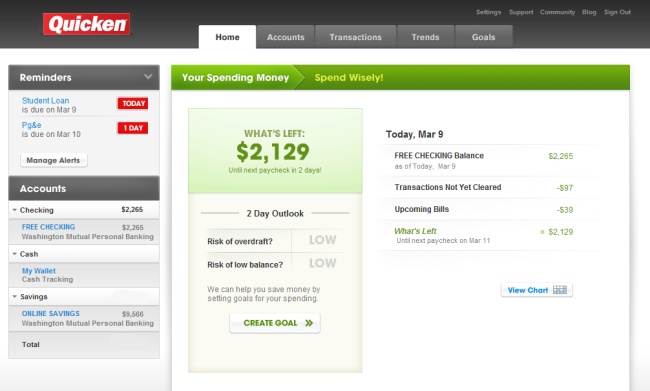
If your job does go away, a smart first step is to declare martial law on your budget, paring down or eliminating all but the most essential expenses. I’ve never (seriously) maintained a personal budget, but doing so will likely be one of the new experiences this downturn introduces me to.
Since I’m unlikely to cut my broadband connection until I’m literally starving, I looked for a solid (and free) online budgeting tool–one that could pull information from elsewhere on the Web, and that was accessible from anywhere.
I settled on Intuit’s basic and free Quicken Online service. The setup took all of 3 minutes, and before I knew it the service was pulling my income and expense information from the last nine months from my online bank account.
The service reads every line item and intelligently applies a category to each (rent, food, entertainment, income, and so on), and then it charts where your money is going and gives you ideas on what you can cut back or eliminate.
Quicken miscategorized a few of my entries, but correcting them was a snap. The service also sets up a series of alarms and reminders for when your bills are due, so that you never incur another late charge. You can have the reminders sent to your e-mail or to your cell phone–and yes, there’s an iPhone app. (Also recommended: Mint.)
LinkedIn JobsInsider
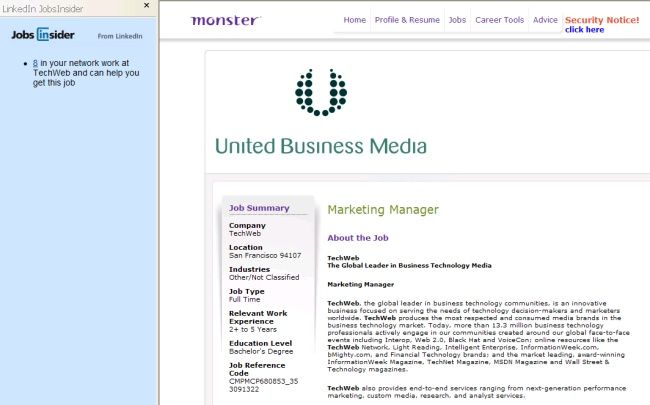
One of the greatest comforts if you are unemployed (or if you’re anticipating that you will be soon) is having a strong network of professional and social friends. Networking on sites such as LinkedIn, which focuses on career-related social networking, can be a powerful way to spread the word that you are looking for work, to advertise your expertise, to get difference-making recommendations from friends, and to find out about job opportunities.
But you already know that. What’s new is that LinkedIn is developing some cool tools to help you while you’re hunting for job opportunities. The company has introduced a downloadable browser add-on called LinkedIn JobsInsider that tells you, in a pane at the left side of your browser window, when you have a LinkedIn contact who might be able to help you with specific jobs you’ve found while searching on job boards (like Monster, for example). Whether you have an “in” with a particular employer can make the difference between expending effort in pursuing the opportunity or spending time looking for something better.
“In fact, one LinkedIn contact can make all the difference in the world,” says Julie Erich, an insurance industry recruiter based in San Francisco. “Put yourself in the shoes of the hiring manager who has 200 resumes on her desk.
She is busy and is looking for ways to reduce that pile to set of solid finalists who will make it to the second round.” The mention of a mutual friend, in the real world or on LinkedIn, can cause the hiring manager to move your resume to the top of the pile, Erich says. “It can get you an interview, [whereas] without that mutual friend you might have been lost in the stack.”
As you might imagine, LinkedIn and sites like it have seen a dramatic uptick in popularity since the economy took a nosedive. A spokesperson told me that LinkedIn has seen a 65 percent increase in recommendations (your friends/contacts saying nice things about you at your profile page) since December 2008.
Meanwhile, she says, the number of applicants per job listing on LinkedIn has doubled over the last 6 months, while the number of job listings has plummeted. These days, a new member is signing up with LinkedIn at a rate of one per second.
SimplyHired
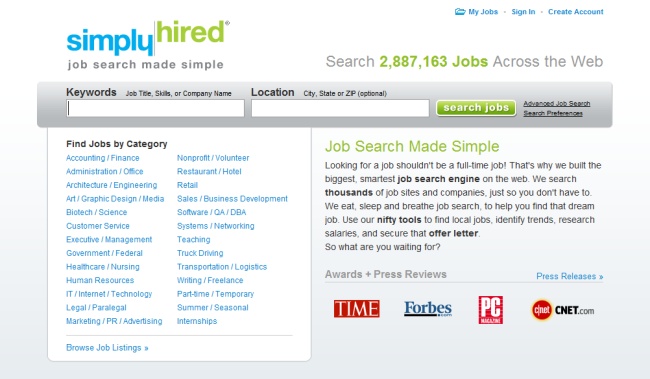
You’ve already heard about the large employment sites, such as CareerBuilder, HotJobs, and Monster. I’m not a big believer in such sites, and I don’t often hear people talking about how wonderful any one of them is. Instead I recommend a relative newcomer called SimplyHired, a startup with financial backing from News Corporation, which owns Fox Networks.
SimplyHired does for (to?) job sites what Kayak does for travel sites: It aggregates job listings from all over the Web, including from the big sites. SimplyHired now lists about 4 million jobs.
I did a few sample searches on the site for marketing positions, and saw openings from perhaps ten different job boards, along with postings that came directly from the hiring companies. The listings give the basic information about the opportunity, and then link you out to the listing at the hiring company’s site or at the job board.
I like the fact that SimplyHired takes advantage of the job data it aggregates to benefit its users. For instance, the site mines the data to produce both salary averages and employment trends (the number of opportunities listed month-to-month, for instance) for the type of job you’re looking for. SimplyHired also offers a couple of tools that seem to be more than window dressing.
One is a Google Maps mashup where you can plot out various commutes to the same job–pretty useful, since the commute is an obvious factor in deciding whether to pursue a particular job listing.
DesperateDollars
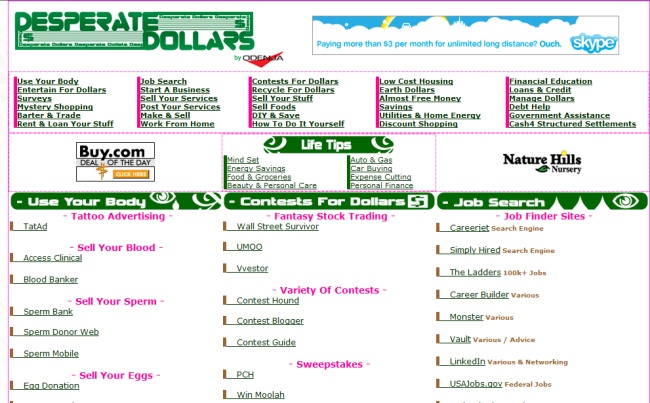
DesperateDollars is filled with ideas for making money if you find yourself in really dire straits–things like getting tattoos for money, growing and selling your own food, doing for-pay surveys and secret-shopping assignments, volunteering for paid clinical tests, or donating sperm, blood, or hair.
The site isn’t the prettiest thing in the world to look at, but I found the assortment of money-making ideas entertaining, as well as somewhat of a comfort: It’s a reminder that the world doesn’t end if you lose your job. With a little creativity, in times of desperation you can still go out and bring home the bacon.
Free Napkin
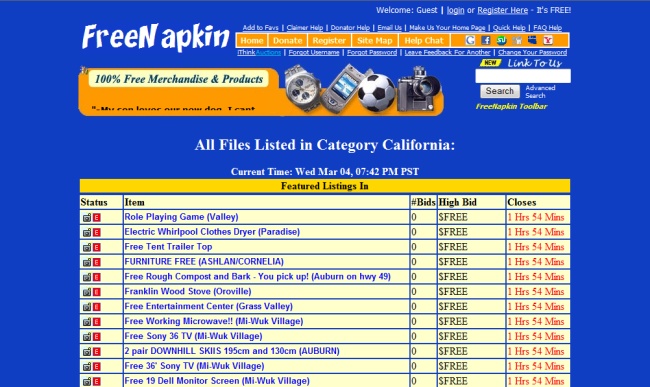
FreeNapkin is like an eBay for free stuff. The site is a magnet for two types of people: folks looking for an easy way to recycle stuff they don’t need by finding a new home for it, and those who are trying to cut costs by getting used stuff for free instead of going out and buying it.
The “givers” post pictures and information about the items they want to dump, and the first FreeNapkin “claimer” to call dibs on the item wins it. The claimer pays the shipping on the item, or picks it up in person (the site filters the donations by city).
People have given away everything from dogs to farm equipment on FreeNapkin. I’ve never donated or claimed anything on FreeNapkin; but judging by the number of listings, the site seems to work well. FreeNapkin is no marvel of fancy Web design, but it gets bonus points for hitting squarely on the need to conserve and reuse things in tough economic times.
Uberi.com
If your income is threatened or interrupted, putting a tight grip on your outgoing cash is essential. Many deal sites have popped up on the Web in the last year, each with a slightly different product focus and approach. Uberi spends about half its time looking for consumer tech deals (TVs, printers, and the like), and the rest gathering listings for things important to families and small businesses, such as food, paper, and clothing.
The deals appear in random order, not categorized, so you must scan through them; the link in each one leads out to the product page at the corresponding retailer’s site.
The site tracks deals at many large retailers such as Amazon and Wal-Mart, which offer discounts on various things every day. Amazon has so many that Uberi presents a “discount table” linking you directly to listings of on-sale products by category and by discount level (10 percent to 90 percent).
If you are the official (or unofficial) purchasing agent for a business or a large household, checking the listings at Uberi to see if they match your needs has the potential to make a real difference when you tally up your costs at the end of the month. (Also recommended: RetailMeNot.)
Meetup
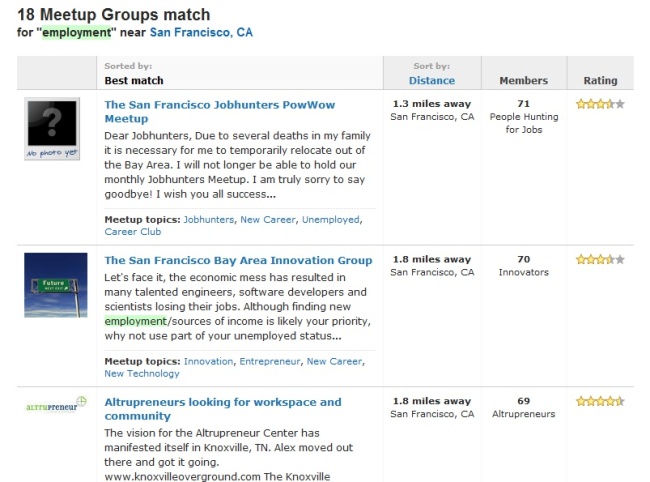
The Internet is a great place to start the process of finding a job, but getting hired happens as a result of direct, face-to-face contact with other people. Meetup provides a platform where anyone, regardless of where they live, can find or set up groups of local, like-minded people with specific shared interests or goals.
More and more employment-related groups are forming on Meetup, as a quick group search on the site reveals. I searched Meetup for groups in my neighborhood (using my zip code), and found several nearby. In such groups you can learn about job opportunities that aren’t advertised, about job fairs and other events, and about people inside or outside of the group who can help you (directly or indirectly) get your foot in the door somewhere.
SmartyPig
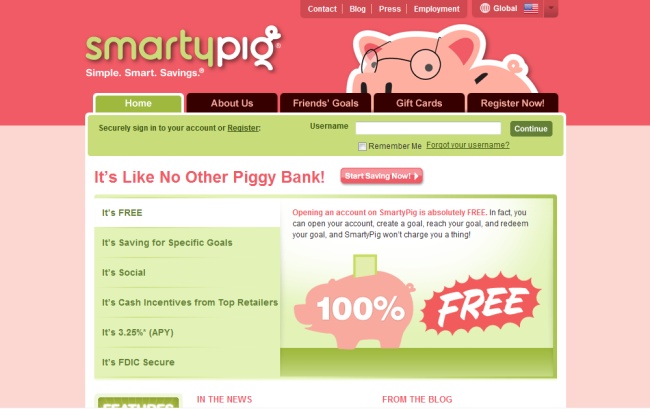
With the economy on the wane, Americans are getting serious about saving money again–savings deposits were up 5 percent in January. It’s a good time to consider SmartyPig, a savings Web site backed by a real FDIC-insured bank that attempts to make saving money more fun (and more successful) by adding social networking elements and Web widgets.
Say you’re saving up for a trip, a wedding, or a down payment on a house. You tell the Pig when you want to meet your goal, and the Pig suggests an automatic monthly payment amount that will allow you to reach it.
You make payments into your account as you would with any online bank. You can then install a SmartyPig widget at your Facebook or MySpace page; this gets your friends involved, which might make you more feel more accountable to your savings goal. SmartyPig even provides an easy way for your friends to donate cash to your cause.
Recessionwire.com
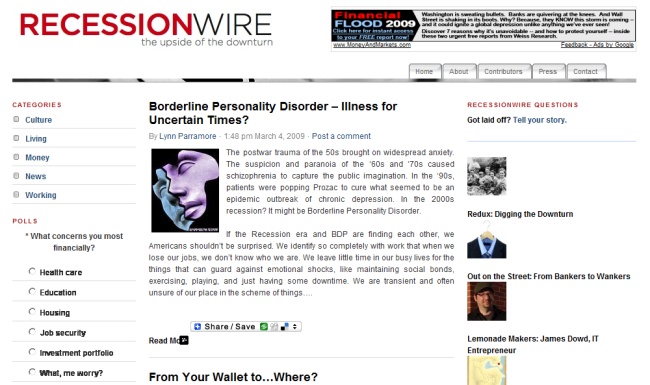
Here’s a cool new site that falls under the “moral support” heading. Recessionwire was founded by three journalists–a couple of Conde Naste Portfolio online editors and a freelancer–who found themselves, uh, underemployed.
The three decided to vent their frustration by starting what they termed a “user’s guide to the recession.”
The site offers news and analysis on the economy (“Recession Briefing”), perspectives, work (or out-of-work) advice, spending tips (“Recession Concessions”), inspiration (spotlights on people who see opportunity in this economy), and insights.
While the site offers a lot of serious news and information, perhaps its best quality is its ability to give you a laugh or two during rough times. Recessionwire takes a decidedly humorous and irreverent approach to the economy and its effects on people. Here’s a quick excerpt from Joe the Trader’s blog: “The jury may still be out on broad societal shifts, but the public quickly volunteered to be judge, jury, and executioner for the Wall Street fat cats. Even in the halcyon days of 2006, Wall Street guys were called douchebags.”
Wise Bread

Wise Bread is just one of a whole new wave of frugality sites. It’s essentially a group of blogs with a discussion forum attached. The blogs cover ideas and advice on personal finance, career, frugal buying, green living, and ways to do everyday things more easily and cheaply (“lifehacks”).
For instance, when I checked today I saw a blog about how the bailout package might affect your mortgage, a piece on cutting down your use of plastic bags, and a bit titled “Beware the Pretty Things: Four Reasons I’m Keeping My Ugly, Old Stuff”. Every day the site features deals from around the Web, as well as advice from an expert on retirement planning and other money matters.
While the site offers many creative ways to simplify your lifestyle and save money, it also makes a big deal out of finding ways to keep some of the luxuries you enjoy, by paying less for them. That makes sense to me; simply removing all the fun things from your life can make you feel morally defeated by your financial woes.
More than anything, I like the cumulative message of Wise Bread–that there is nothing wrong (and a lot right) with living within your means. At a time when debt, both personal and institutional, is wreaking so much havoc on so many people’s budgets, it seems appropriate to ditch the idea that buying new and on credit is the proper thing to do, and that those “pretty things” we think we want will lead to happiness.
Whether you are employed, underemployed, or unemployed, I hope you will check out some of these ten sites. All have something to offer regardless of your employment status, even if it’s just a quick laugh or a little inspiration. And, as always, I invite you to let me know about sites that have helped you manage money, find a job, or keep your mind right during these hard economic times.
Source: PCworld.com




